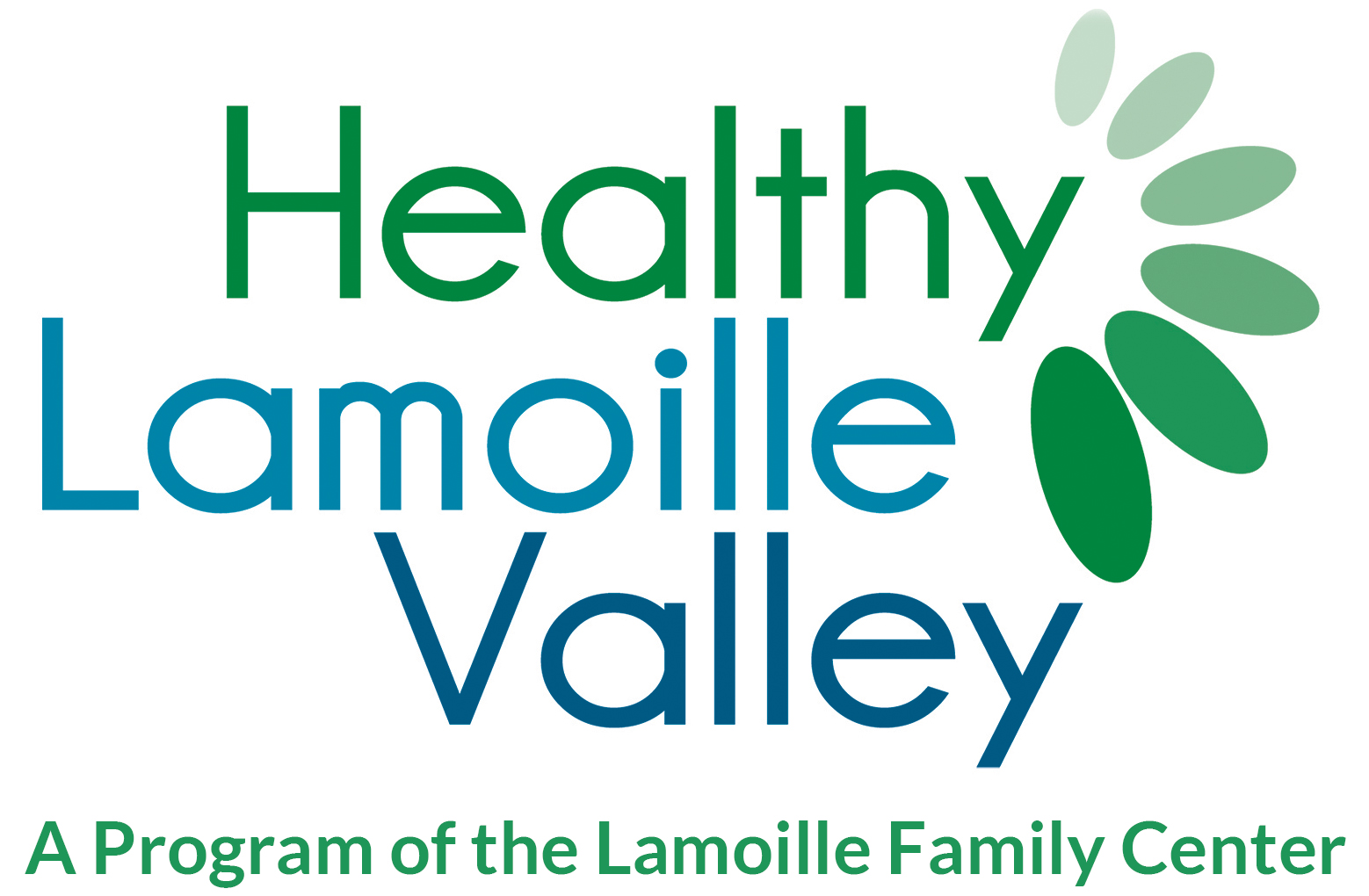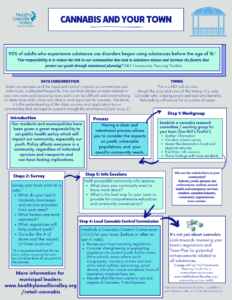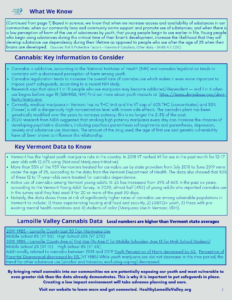Considering Retail Cannabis in the Lamoille Valley – A Resource from Healthy Lamoille Valley and the Lamoille County Planning Commission
Click here to download the presentation
Visit our general retail cannabis and Act 164 information page here
Download our new handout for towns!
Note: before you print, make sure your printing settings are “fit to page.”
Jump to
Who we are
How we’re looking at this issue
Words we use
Act 164 summarized
Considerations for your community
Timeline
Cannabis Control Board
What can you do in your community?
- establish a committee or workgroup
- survey your town
- hold community information sessions
- the vote
- policy options
Who we are
Healthy Lamoille Valley is a coalition of community organizations and individuals working collaboratively to reduce youth substance misuse and encourage youth to make substance free healthy choices. We are a program of the nonprofit Lamoille Family Center, one of 15 Parent Child Centers across the state providing a network of care for children, families and youth. Primarily grant-funded, we were awarded a Drug Free Communities Grant (DFC) in 2019.
The Lamoille County Planning Commission is one of 11 Regional Planning Commissions serving Vermont’s local communities. LCPC operates under the Vermont Municipal and Regional Planning & Development Act and its adopted bylaws. LCPC is a member of the Vermont Association of Planning & Development Agencies (VAPDA). The 2019 VAPDA brochure can be viewed here. All towns and villages are, by law, members of the regional planning commission. However, active participation is voluntary.
How we’re looking at this issue from a prevention framework
Science show us that young people who use alcohol, marijuana, tobacco and other substances are more likely to develop substance dependency in their lifetime than those who delay use until after age 21 or later. 40% of young people who begin using before the age of 15 will develop a substance dependency issue while the risk drops to 7% when use occurs after age 21.
In Lamoille County, 20% of youth report that they are using before the age of 13, and 26% of Lamoille County high school students report using marijuana in the last month. Recognizing that the adolescent years are one of the most critical for brain development, we come together as youth, parents, educators, health providers, and community members to reduce youth substance use in our communities, schools, and towns.
Our work at HLV is based on identifying the risks that exist in our communities that contribute to young people using during this critical time in their brains development. We also focus our work on increasing the protective factors in our communities that help to prevent youth use.
One risk factor that our data assessments have shown is important to focus on in our communities is around community laws and norms that support substance use. The more that substances are available and the more that “use” is normalized in our communities, directly correlates to our youth using during that critical brain development time.
The retail cannabis conversation in Vermont as put forth in Act 164 is relevant to our work. We feel there is a way for towns hosting retail cannabis to balance the needs of adults who choose to access and use cannabis while also protecting the health of those who should not (children/youth) or choose not to access or use. This change in law will make cannabis more accessible and likely make use more normed in our communities. So how can we move forward with this new law in a way that we can protect our youth from any negative impact?
Words we use make a difference
- We don’t call people addicts, but instead say a “person with substance use dependency”
- We don’t say substance “abuse” which has a negative connotation and instead “substance use/or misuse”
- We use the term “adult-use cannabis” or “retail cannabis” and not “recreational cannabis”, since “recreation” has an association, especially for our youth, of being positive and desired.
- We work towards using the term “cannabis” and not “marijuana” because of equity considerations.
- Cannabis THC and CBD are different – the information on this page relates to Cannabis THC.
- Dispensary is a term used for where to get medical cannabis and not a retail establishment.
Act 164 Summarized
- Legalizes sale / purchase / taxation of adult use cannabis with regulation (establishes a retail market)
- Creates an independent commission within the executive branch — the Cannabis Control Board — to regulate and license adult-use cannabis business in VT and make recommendations to legislature (Still a lot unknown)
- Retail sale may begin October 2022
- Minimum age is 21
- Public consumption is not allowed
- 30% THC limit for Cannabis flower, 60% limit for concentrates
- All sales (6%) and excise tax revenue (14%) sent to the State for funding universal afterschool and prevention initiatives
- Towns can vote to “Opt In” the retail sale of adult use cannabis (and integrated licenses)
Considerations for your community:
- How informed is your community about Act 164 and the implications?
- What do your town’s residents think about having retail cannabis in town?
- What do your town’s businesses think about having retail cannabis in town?
- Who are the stakeholders in your community who your town can engage on this topic? (schools, youth, parents, law enforcement, medical community, emergency services, retailers, community organizations, town entities)
- How might you plan to assess the demand on local and regional services? (law enforcement, medical, mental health, environmental, solid waste management, energy systems, traffic impacts) and what about the impact of potential ancillary businesses, etc?
- What is the best way for your town to provide for a comprehensive education and community conversation in advance of a vote to opt-in (or at this time in your town’s process)?
- If your town opts in- what additional regulations would you like to see? (ex. buffer zones from schools and areas where youth congregate, buffer zones between other retail outlets, outlet density, site plan review standards, hours of operation, etc.)
Timeline
Towns can opt in at any time by Australian ballot to retail and/or integrated licenses. Note: There is not an opt-in by town for all other cannabis licenses.
- 4/1/2022 – Integrated license applications
- 5/1/2022 – integrated licenses issued – may sell immediately
- 9/1/2022 – retail applications begin
- 10/1/2022 – retail licenses issued

CCB: Cannabis Control Board (State level)
Meetings continue for the Full Board and Sub-Committees. The meeting schedule can be found here.
The CCB will establish regulations and administer compliance and enforcement. The CCB will oversee regulations for:
- Cultivators
- Testing laboratories
- Product manufacturers
- Wholesalers
- Retailers
- Integrated licenses
- Recent updates / current items up for consideration
Note: While the CCB is creating baseline rules/regulations, towns may be given local control to craft rules/regulations that best fit what they want for their communities
Recent CCB updates / current items up for consideration:
- Making recommendations for tax and regulate structure, considering:
- Capping local license fees at $100
- Proposing to legislature a 1%-2% tax for towns opting in; currently NO tax revenue for towns that don’t have local options tax
- Focusing on policies that address social equity to overcome negative impacts of the war on drugs
- Set new “buffer zone” rule prohibiting retail store within 500 ft. from school – 1000’; towns will be allowed to choose their own (reduce or expand) up to 1000’
What Can You Do In Your Community?
Establish a cannabis research committee/working group for your town
Establish a workgroup of volunteers from multiple sectors, including youth (time bound, specific goals)
Workgroup purpose:
- Responsible for town survey and information sessions
- Link their data and research to the CCC or town planning commission, if a town votes to opt-in
Example: Woodstock, Vermont
- Woodstock created a cannabis research committee made up of volunteer committee members with help from project advisors within the fields of safety, health, schools, legislative, and town planning. Responsible for town survey and information sessions
- Worked together at weekly meetings to research, collect, and analyze data and statistics
- Remained objective and neutral, did not make policy recommendations
Here are some additional resources for your town workgroup:
Resources around Act164 from Prevention Works VT
Healthy Lamoille Valley’s Community Planning Toolkit
Survey your town residents prior to a vote
Example questions:
- Zip code of residence
- Demographics: Select all that apply whether town resident, business owner, town employee, youth, parent, health sector, law enforcement, education, etc.
- Select age category
- Rate current awareness on Act 164
- Should the town schedule a vote on whether to opt in to retail cannabis?
- What factors will weigh into your decision when voting on retail cannabis in your town? (tax revenue, indirect revenue (tourism, grand list impact) , municipal services and infrastructure, tourism, youth prevention, impact on local systems, access and availability for youth, access and availability for adults, aesthetics of our town, safety, environmental considerations, other, etc)
- Would you be interested in attending informational sessions prior to an opt in vote?
- Which topics do you want more information about? (public safety, cannabis and health, cannabis use and youth, tourism, agricultural considerations, environmental considerations, details of Act 164/retail cannabis law, town regulations to limit youth exposure to cannabis, Act 164 tax revenue structure)
- What other substance related concerns would you like to address in your town on an educational and/or policy level (alcohol, tobacco, vaping, opioids, over the counter medicine, other trending substances?
Note: When surveying your town, ensure diverse participation including youth.
Hold community information sessions
Informational topics on issues residents are most interested in. Examples include:
- Tourism
- Taxation/fees/indirect revenue/grand list impact
- Health, environmental and safety impact
- Youth prevention
- Equity
- Impact on local systems and services
- Act 164 review
- Cannabis: THC, CBD, medical, retail, etc.
- Other considerations
The vote
Prior to a cannabis retailer operating within a municipality, the municipality shall affirmatively permit the operation of such cannabis establishments by majority vote of those present and voting by Australian ballot at an annual or special meeting warned for that purpose. A municipality may place retailers or integrated licensees, or both, on the ballot for approval.
The question can be put on the ballot by the Selectboard or via the standard resident’s 5% signature collection process.
If opt-in is the favorable choice, then work to establish local regulations based on workgroup input and recommendations (e.g. zoning, local Cannabis Control Commission) depending on resident wishes.
If opting in, next steps:
- Establish a local Cannabis Control Commission (CCC)
- Review your town’s existing regulations
- Consider strengthening or expanding regulations
- Look towards creating and/or adding goals and objectives to your Town Plan on the topic of Health and Wellness, Substance Use
- Create a Health and Wellness Committee (consider adding a youth voice)
Establishing a local Cannabis Control Commission (CCC)
A municipality that hosts any cannabis establishment may establish a cannabis control commission composed of commissioners who may be members of the municipal legislative body. The local cannabis control commission may issue and administer local control licenses under this subsection for cannabis establishments within the municipality. The commissioners may condition the issuance of a local control license upon compliance with any bylaw adopted pursuant to 24 V.S.A. § 4414 or ordinances regulating signs or public nuisances adopted pursuant to 24 V.S.A. § 2291. The commission may suspend or revoke a local control license for a violation of any condition placed upon the license.
If opted in, municipalities may:
- Develop regulations and municipal licensing requirements and create a Local Cannabis Commission to oversee such rules
- Establish density rules for retail sales locations or minimum distances from certain establishments e.g. schools, other retail cannabis locations
- Establish permitting fees (amounts to be clarified by CCB)
- Call another vote on the topic of retail cannabis in the future
- If Opt In is defeated, existing retail operations are grandfathered in.
- May not establish zoning rules that would de facto prohibit the establishment of such retail businesses; may not prohibit any cannabis business type using their local ordinances or permitting.
Policy options- consider your town’s current policies and options at this time
- Zoning can be a useful protective tool, as it allows a town to place a “buffer zone” of a certain distance between businesses focused on age-restricted products — such as vape shops, cannabis dispensaries, and adult entertainment stores (and each other) – and/or child- and family-centered establishments such as schools, churches, libraries, and daycare centers. (Note that existing businesses may be grandfathered in.)
- Substance Ordinances can be adopted to regulate the use and consumption of certain substances in public places in town and may include an Alcohol Ordinance and a Smoking/Vaping Ordinance for both tobacco and cannabis.
- Sign ordinances can be adopted to help minimize the impact of messaging for age-restricted products by controlling aspects of types of signage allowed. The ordinance must be content-neutral, meaning the regulations cannot be based on the content of the sign, and the regulations will apply to all businesses. Minimized signage for age-restricted products is also a feature of recovery-friendly and sobriety-friendly communities.
- Health Chapters in town plans allow the town to set forth its goals, policies, and recommended actions relating to public health in a document that is then adopted by the town.
- Town Health and Wellness Committees of town citizens can be formed to advocate for healthy town policies and implement town-identified action items of the town plan’s health chapter.
Have you considered these policy approaches related to cannabis and other substances in your town?
-
- Advertising/signage ordinance
- Use ordinances
- Zoning
- Site Plan Review
- Buffer zones
- Outlet density or number of licenses
- Hours of operation
- Security requirements
- How much product can be stored on location
- What about ancillary businesses?
Resources:
Vermont Cannabis Legalization Information for Selectboards and Regional Commissions
Produced by Windham County Prevention Partnership.
PreventionWorksVT! Cannabis Resources
PreventionWorksVT! is a network of community coalition leaders, prevention consultants, service providers and individuals with an interest in and a commitment to, substance misuse prevention across the state of Vermont. Visit their Cannabis and Act 164 Information Page for more information. They also maintain a resource folder for their Act 164 Workgroup here. You can view their presentation on the subject here.
Marijuana Prevention from a Town Perspective
Produced by the Bennington County Regional Prevention Partnership, includes data and action steps.
Cannabis/Marijuana Resources
Our on-going resource page for cannabis/marijuana data and other information.
Healthy Lamoille Valley Community Planning Toolkit
This Community Planning Toolkit: Preventing Youth Substance Misuse and Building Protective Factors is a community planning guide focusing on reducing youth misuse of alcohol, tobacco, cannabis and prescription drugs, while supporting efforts to help youth make healthy substance-free choices. Also see the toolkit resource page: Community-Wide Strategies for Town Plans and Policy Development.
Preventing Marijuana Use Among Youth Resource Guide
Produced by Substance Abuse and Mental Health Services Administration (SAMHSA). The goal of this guide is to review the literature on prevention of marijuana use among youth, distill the research into recommendations for practice, and provide examples of the ways these recommendations can be implemented.
Act 164 Roundtable
On October 28th, 14 Lamoille Valley community leaders from seven towns, including two state legislators, gathered on Zoom for a roundtable entitled “Act 164 Roundtable: Considerations on Retail Cannabis for Lamoille Valley Municipal Leaders”. This event, a collaboration between Healthy Lamoille Valley and the Lamoille County Planning Commission, was held to raise awareness about Act 164 planning considerations, address local questions about retail cannabis and identify areas of needed municipal support.
Early on, participants were asked how informed they thought their community was about Act 164 and the implications. More than two-thirds responded that their community was either slightly informed or not at all. As for themselves, the majority of the group’s response to the same question ranged from slightly to somewhat informed. These answers highlight the need for more education and information for our Lamoille Valley community.
Participants at the event were asked to consider:
- How might your town plan to assess the demand on local and regional services?
- What is the best way for your town to provide for a comprehensive education and community conversation in advance of a vote?
- Who are the stakeholders in your community that your town can engage on this topic?
- If your town opts-in, what additional regulations would you like to see?
The top three factors identified by participants that will most affect local decisions when considering retail cannabis for their town were: safety, youth substance prevention, and tax/fee and indirect revenue impact (such as tourism).
Throughout the roundtable, questions were raised on zoning and taxation, impact on law enforcement, and the possibility of odor ordinances (from growing cannabis), as well as questions about public health impact on youth and young adults. Lamoille County Planning Commission Deputy Director Seth Jensen shared answers as they related to municipal planning. Legislators in attendance added perspective on the law, while also gathering information about local concerns. It is important to note that many of the details are still being defined by the State’s Cannabis Control Board (CCB).
Healthy Lamoille Valley and the Lamoille County Planning Commission will continue working to support local municipalities on issues related to Act 164. Both co-facilitators are happy to continue conversations, contact Seth Jensen at seth@lcpcvt.org and Policy and Outreach Coordinator Alison Link at alison@healthylamoillevalley.org.


